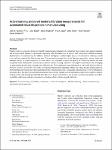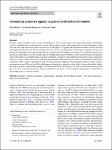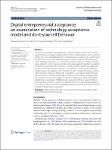Search
Author
- Marina, Dabić (3)
- Christa, Sys (2)
- Domingo, Ribeiro-Soriano (2)
- Gittell, Ross (2)
- next >
Subject
- kinh tế (26)
- Economics (12)
- Management science (7)
- Development Economics (6)
- next >
Date issued
- 2020 - 2023 (306)
- 2010 - 2019 (47)
- 2009 - 2009 (1)
Has File(s)
- true (354)
Search Results
Quality control is a crucial activity performed by manufacturing enterprises to ensure that their products meet quality standards and avoid potential damage to the brand’s reputation. The decreased cost of sensors and connectivity enabled increasing digitalization of manufacturing. In addition, artificial intelligence enables higher degrees of automation, reducing overall costs and time required for defect inspection. This research compares three active learning approaches, having single and multiple oracles, to visual inspection. Six new metrics are proposed to assess the quality of calibration without the need for ground truth. Furthermore, this research explores whether existing calibrators can improve performance by leveraging an approximate ground truth to enlarge the calibrati... |
In an increasingly technology-oriented society, companies should ensure not only that they have an Internet presence but also that they are conveying the right image. According to the resource-based view, online reputation is a key intangible asset for successful technological business change. The aim of this research is to analyze the online reputation of companies in the agri-food sector, identifying the factors that have an impact on it. For this purpose, fuzzy-set qualitative comparative analysis is used. The results show that online reputation is conditioned by legal form and attributes associated with the company website. Such attributes include website quality, the presence of information associated with corporate social responsibility, the use of a secure connection, and the... |
In this paper, we contribute to the topic of the non-performing loans (NPLs) business profitability on the secondary market by developing machine learning-based due diligence. In particular, a loan became non-performing when the borrower is unlikely to pay, and we use the ability of the ML algorithms to model complex relationships between predictors and outcome variables, we set up an ad hoc dependent random forest regressor algorithm for projecting the recovery rate of a portfolio of the secured NPLs. Indeed the profitability of the transactions under consideration depends on forecast models of the amount of net repayments expected from receivables and related collection times. Finally, the evaluation approach we provide helps to reduce the ”lemon discount” by pricing the risky com... |
This study proposes that naming a firm eponymously is a mechanism that small private firms can use to signal their superior financial performance and commitment to fulfill debt contract obligations. Using 621,614 small private firms in Europe over the period 2008–2018, we find that small private eponymous firms pay significantly lower interest on their debts and have more long-term debt than non-eponymous firms. Our findings are robust to various controls and placebo tests. Additional analyses show that eponymy lowers the cost of debt and facilitates long-term debt via reputation signaling and private information. We also document that the effect of eponymy on debt contracting is most pronounced when there is less financial development and when firms’ dependence on external financin... |
In today’s connected market, brands are more likely than ever to face negative press that can put their customer relationships to the test. Building and fortifying positive aspects of the brand-customer relationship (such as brand commitment, brand love and self-brand connections) may ward off some of the impact of negative information on customers, but this does not always provide full protection. Even customers who love a brand can turn against it when negative information enters the picture. Considering this, the current study provides an exploratory investigation into a new way to build up customer resilience that would otherwise not be formed simply by strengthening positive attributes of the customer-brand relationship. It argues that brands can strengthen their customers’ imm... |
With this study, brand managers can have an overview of the major concepts and characteristics of brands over time, while academics receive a mapping of the most analyzed topics and suggestions for future research. Based on the documents published in Scopus and Web of Science databases using the word “brand”, this article aims to provide an overview of the brands and suggest opportunities for future research. Text mining clustering allowed the processing of a large amount of information and organized the first overview of the concepts that have been studied. Thus, first, we examine the existing definitions of a brand. Then, we provide a historical perspective of the topics associated with brand constructs and their associations and present a framework for the psychological character... |
The study extended the existing literature on digital entrepreneurship, do-it-yourself and technology acceptance models with the help of empirical data. It further aimed to identify the factors associated with the e-entrepreneurial acceptance by examining the integration of do-it-yourself and technology acceptance models. A data sample consisting of 200 questionnaires were collected from small–medium enterprise using the digital platforms for their business activities. Structural equation modeling was applied for testing the association of the models. A robust theoretical framework adopted to validate to use digital entrepreneurship as a standalone or along with the traditional entrepreneurial. The study was only limited to the small–medium enterprises working in the context of Paki... |
Increasing levels of urbanisation and the rapid growth of modern cities require that particular attention be paid to ensuring the safety and protection of living conditions for their inhabitants. In this context, natural and human-induced disasters pose a major threat to the safety and normal operational procedures of buildings and infrastructures. In consequence, disaster management and built assets operations demand modern tools to be effectively prepared in order to better respond to such critical events. This study explores the potential of artificial intelligence in these operational fields by developing a deep learning model that is able to provide a rapid assessment of an asset’s structural condition in the case of a seismic excitation. The proposed simulation model makes an ... |
While research on factors contributing to the success of a reward-based crowdfunding project is abundant, research dedicated to projects that were not only successful, but received significantly more funds than initially targeted—overfunded projects—is still scarce. Following a qualitative case-study approach, this study sought to shed light on this phenomenon through examining expert interviews with supporters and team members of an overfunded crowdfunding project considered a critical case. The results are divided into three phases that differentiate characteristics ascribed to the crowd, the project, and the communication. The main findings highlight the central role of the project founders’ reputation and experience, that a positive sentiment among the crowd towards the project ... |
Managers often make decisions in situations involving risk and uncertainty. To ensure the prosperity of the company, neutral behavior is desirable in such situations. However, when evaluating future-oriented managerial actions, cognitive biases can arise that are manifested as aversions towards risky and uncertain situations, leading to non-optimal decisions. In an online experiment with a convenience sample of 298 US participants, we investigate deviations from risk- and uncertainty-neutral managerial decisions and apply neutrality-promoting behavioral interventions in a business venture setting. We find that using a recommendation nudge before as well as after making an initial decision improves individual performance to achieve higher neutrality levels. |










